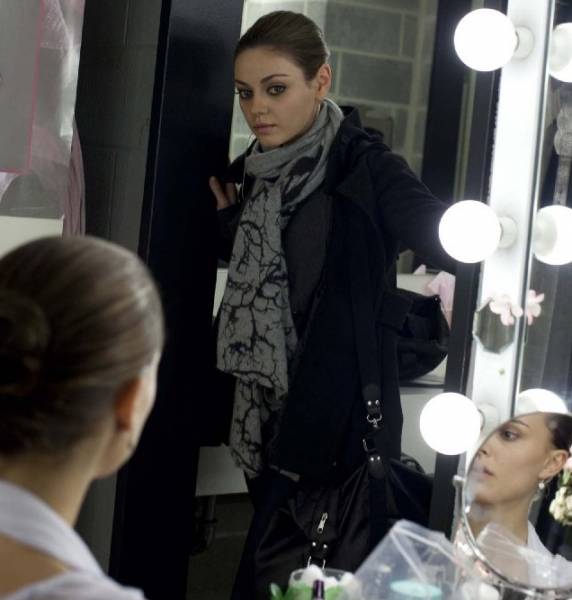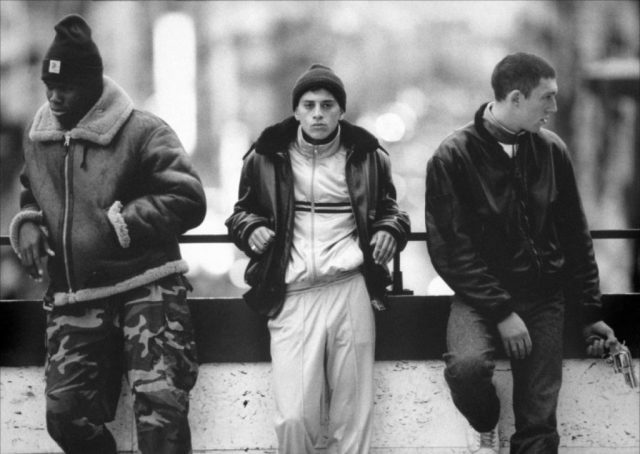
Hubert (Hubert Koundé), Saïd (Saïd Taghmaoui), and Vinz (Vincent Cassel) experience a wild and dangerous day in La haine
LA HAINE (HATE) (Mathieu Kassovitz, 1995)
Metrograph
7 Ludlow St. between Canal & Hester Sts.
March 1, 2, 4, 7, 9
Festival runs March 1-24
212-660-0312
metrograph.com
On March 1, Metrograph kicks off the series “Forever Young,” featuring fifteen international works with unique perspectives on youth culture. Among the selections are Terry Zwigoff’s Ghost World, Tsai Ming-liang’s Rebels of the Neon God, and Luis Buñuel’s Los Olvidados.
One of the highlights is Mathieu Kassovitz’s underseen incendiary 1995 stunner, La haine, inspired by the real-life stories of Makome M’Bowole and Malik Oussekine, two young men who were killed by police in 1993 and 1986, respectively. Kassovitz’s second feature film (following Métisse), La haine, which means “hate,” is set in the immediate aftermath of Paris riots as three friends —the Jewish Vinz (Vincent Cassel), the Afro-French Hubert (Hubert Koundé), and the Arab Saïd (Saïd Taghmaoui) — spend about twenty hours wandering the mean streets of their banlieue (suburban projects) and Paris, causing minor mayhem as they encounter skinheads, stop off for some wine at an art opening, try to get into a hot club, and, over and over, become embroiled with the police.
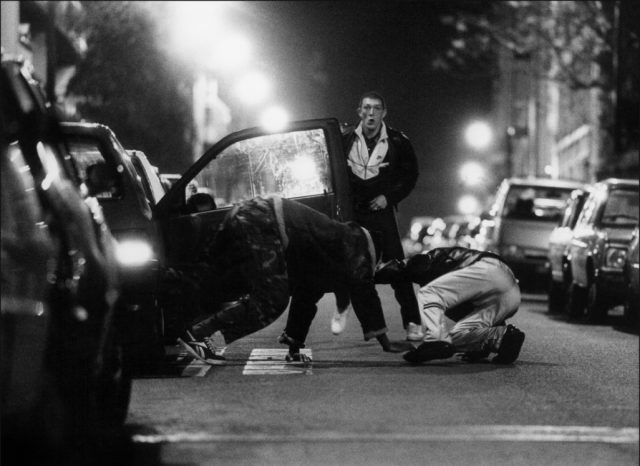
Vinz (Vincent Cassel) sees trouble coming in Mathieu Kassovitz’s explosive La haine
The disaffected youths are fed up with a system that continues to treat them as outsiders, assuming they are criminals. Hubert wants to get out of the banlieue through hard work, but he keeps running into obstacles that are out of his control; at one point, when something goes wrong, he closes his eyes as if he can wish it away. Saïd is an immature schemer who thinks he can slide out of any untoward situation, especially with the help of his much more grounded older brother. But Vinz is a significant problem; one of their friends, Abdel (Abdel Ahmed Ghili), was arrested at the riots and has been severely injured while in police custody. Vinz has sworn to kill a policeman if Abdel dies, something that becomes more possible when he picks up a gun an officer dropped. “I’m fuckin’ sick of the goddam system!” Vinz proclaims, filled with resentment. The three young men pass by a few signs that say “The World Is Yours,” a reference to Scarface, but that seems far out of reach for them.
Photographed in gritty black-and-white by Pierre Aïm and edited with a caged fury by Kassovitz and Scott Stevenson, La haine is electrifying cinema, a powder keg of a film ready to explode at any second. The time is shown onscreen before each scene, going from 10:38 to 06:00, like a ticking time bomb. The film has a documentary-like quality, complete with actual news footage of riots and violence. Kassovitz shows up as a skinhead, while his father, director and writer Peter Kassovitz, is a patron at the art gallery. The soundtrack features songs by French hip-hoppers Assassin; Cassel’s brother, Mathias Crochon, is a member of the group. And look for French star Vincent Lindon’s riotous cameo as a very drunk man.
Several times Vinz appears to be looking straight into the camera, pointing his gun accusingly at the audience; his complete disdain for all types of authority is reckless and dangerous but also understandable, and Kassovitz is extending that rage beyond the screen. In fact, during the November 2005 riots in France, people looked to Kassovitz for a response, and the writer-actor-director eventually got into a blog battle with Minister of the Interior Nicolas Sarkozy, who would later become prime minister. Kassovitz wrote, “As much as I would like to distance myself from politics, it is difficult to remain distant in the face of the depravations of politicians. And when these depravations draw the hate of all youth, I have to restrain myself from encouraging the rioters.”
Sarkozy replied, “You seem to be acquainted with the suburbs well enough to know, deep inside you, that the situation has been tense there for many years and that the unrest is deep-rooted. Your film La haine, shot in 1995, already showed this unease that right-wing and left-wing governments had to deal with, with varying results. To claim this crisis is down to the Minister of the Interior’s sayings and doings is yet another way of missing the point. I attributed this to an untimely and quick-tempered reaction.”
Have things gotten better in the last thirty years, or are governments still missing the point?
[Mark Rifkin is a Brooklyn-born, Manhattan-based writer and editor; you can follow him on Substack here.]
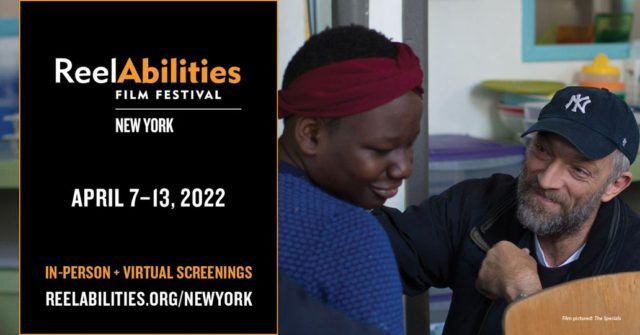
 BAM and Triple Canopy, the New York–based online magazine, have teamed up to present the provocative film series “On Resentment,” which kicks off March 20 at 7:30 with Mathieu Kassovitz’s incendiary 1995 stunner, La haine, inspired by the real-life stories of Makome M’Bowole and Malik Oussekine, two young men who were killed by police in 1993 and 1986, respectively. Kassovitz’s second feature film (following Métisse), La haine, which means “hate,” is set in the immediate aftermath of Paris riots as three friends —the Jewish Vinz (Vincent Cassel), the Afro-French Hubert (Hubert Koundé), and the Arab Saïd (Saïd Taghmaoui) — spend about twenty hours wandering the mean streets of their banlieue (suburban projects) and Paris, causing minor mayhem as they encounter skinheads, stop off for some wine at an art opening, try to get into a hot club, and, over and over, become embroiled with the police.
BAM and Triple Canopy, the New York–based online magazine, have teamed up to present the provocative film series “On Resentment,” which kicks off March 20 at 7:30 with Mathieu Kassovitz’s incendiary 1995 stunner, La haine, inspired by the real-life stories of Makome M’Bowole and Malik Oussekine, two young men who were killed by police in 1993 and 1986, respectively. Kassovitz’s second feature film (following Métisse), La haine, which means “hate,” is set in the immediate aftermath of Paris riots as three friends —the Jewish Vinz (Vincent Cassel), the Afro-French Hubert (Hubert Koundé), and the Arab Saïd (Saïd Taghmaoui) — spend about twenty hours wandering the mean streets of their banlieue (suburban projects) and Paris, causing minor mayhem as they encounter skinheads, stop off for some wine at an art opening, try to get into a hot club, and, over and over, become embroiled with the police.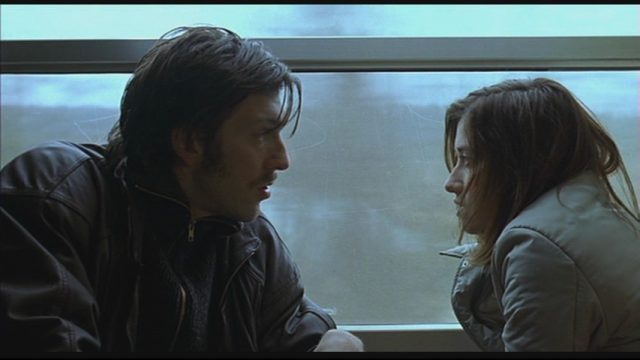
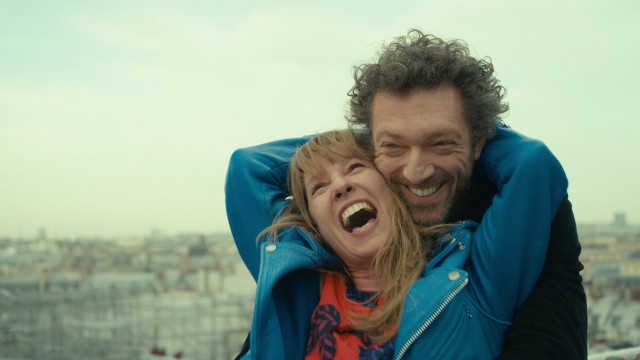
 Emmanuelle Bercot shared the Best Actress award at Cannes with Cate Blanchett and Rooney Mara for her emotional roller coaster of a performance as a woman dealing with both physical and psychological pain in the overwrought, insufferable My King. Writer-director Maïwenn (
Emmanuelle Bercot shared the Best Actress award at Cannes with Cate Blanchett and Rooney Mara for her emotional roller coaster of a performance as a woman dealing with both physical and psychological pain in the overwrought, insufferable My King. Writer-director Maïwenn (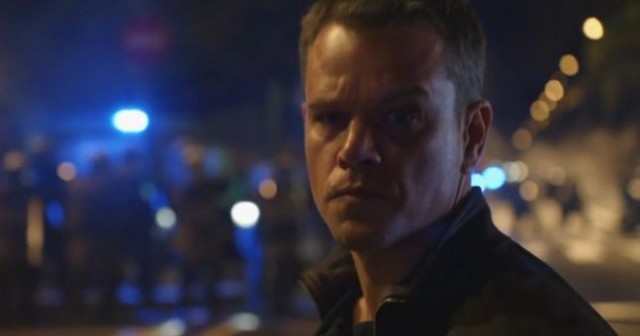
 Perhaps Universal named the fifth Jason Bourne film Jason Bourne because The Bourne Idiocy would probably not have made for very good box office. The fifth entry in the action-espionage series based on the Robert Ludlum character is a lackluster, repetitive bore. Oh, there are plenty of chases, fistfights, and shootouts in locations around the world, but there is rarely any legitimate drama to fill in the gaping plot holes. After skipping The Bourne Legacy, Matt Damon is back as the mysterious government killing machine, still on the run from the CIA, which is now headed by Robert Dewey (an incredibly craggy-faced Tommy Lee Jones). Dewey has hired the Asset (Vincent Cassel) to take out Bourne, who is digging into his past, trying to uncover his father’s (Gregg Henry) role in the top- secret Treadstone program in order to find out more about himself.
Perhaps Universal named the fifth Jason Bourne film Jason Bourne because The Bourne Idiocy would probably not have made for very good box office. The fifth entry in the action-espionage series based on the Robert Ludlum character is a lackluster, repetitive bore. Oh, there are plenty of chases, fistfights, and shootouts in locations around the world, but there is rarely any legitimate drama to fill in the gaping plot holes. After skipping The Bourne Legacy, Matt Damon is back as the mysterious government killing machine, still on the run from the CIA, which is now headed by Robert Dewey (an incredibly craggy-faced Tommy Lee Jones). Dewey has hired the Asset (Vincent Cassel) to take out Bourne, who is digging into his past, trying to uncover his father’s (Gregg Henry) role in the top- secret Treadstone program in order to find out more about himself.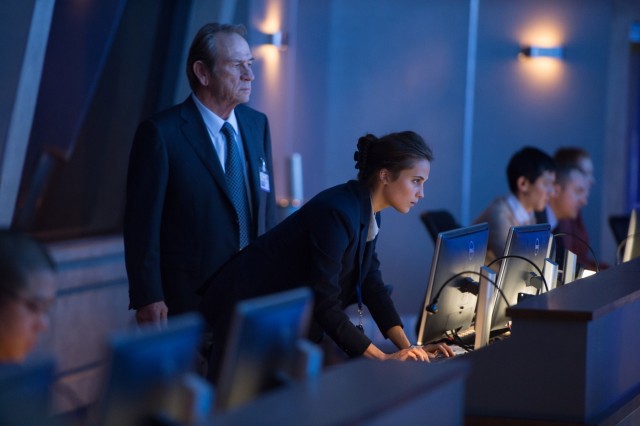

 A companion piece to 2008’s multilayered The Wrestler, in which a rejuvenated Mickey Rourke plays an aging athlete trying to regain control of his body and his life while attempting to reestablish a connection with his daughter, Darren Aronofsky’s Black Swan is an even more complex psychological study of just how far the mind and body can go to get what it wants and needs. Natalie Portman stars as Nina Sayers, a member of a Manhattan-based ballet company who is vying for the lead role in a new production of Tchaikovsky’s classic 1877 ballet, Swan Lake, the tragic tale of a princess transformed into a white swan who must find true human love to be released, complicated by an evil magician, a black swan rival, and a handsome prince. Nina lives a sheltered existence dominated by her failed-ballerina mother, Erica (Barbara Hershey), squeezed into a cramped New York City apartment and not allowed to have a social life. Womanizing choreographer Thomas Leroy (Vincent Cassel) is convinced that Nina can dance the white swan but has severe doubts that she has it within her to dance the black swan, even after selecting her to replace former prima ballerina Beth MacIntyre (Winona Ryder). Desperate to bring out Nina’s dark side, Leroy creates a competition between her and free-spirited dancer Lily (Mila Kunis), a sexy, tattooed young dancer who lives life on the edge. As opening night approaches, Nina must reach deep inside herself if she is to attain her dream, leaving all her fears and insecurities behind.
A companion piece to 2008’s multilayered The Wrestler, in which a rejuvenated Mickey Rourke plays an aging athlete trying to regain control of his body and his life while attempting to reestablish a connection with his daughter, Darren Aronofsky’s Black Swan is an even more complex psychological study of just how far the mind and body can go to get what it wants and needs. Natalie Portman stars as Nina Sayers, a member of a Manhattan-based ballet company who is vying for the lead role in a new production of Tchaikovsky’s classic 1877 ballet, Swan Lake, the tragic tale of a princess transformed into a white swan who must find true human love to be released, complicated by an evil magician, a black swan rival, and a handsome prince. Nina lives a sheltered existence dominated by her failed-ballerina mother, Erica (Barbara Hershey), squeezed into a cramped New York City apartment and not allowed to have a social life. Womanizing choreographer Thomas Leroy (Vincent Cassel) is convinced that Nina can dance the white swan but has severe doubts that she has it within her to dance the black swan, even after selecting her to replace former prima ballerina Beth MacIntyre (Winona Ryder). Desperate to bring out Nina’s dark side, Leroy creates a competition between her and free-spirited dancer Lily (Mila Kunis), a sexy, tattooed young dancer who lives life on the edge. As opening night approaches, Nina must reach deep inside herself if she is to attain her dream, leaving all her fears and insecurities behind.